Online Travel Agents: What They Are and How They Work
Sep 26, 2025
 Mika Takahashi
Mika TakahashiPopular Categories
Hotel Technology & InnovationHotel Operations OptimizationDigital MarketingIndustry TrendsRevenue ManagementHospitality Industry
Popular Categories
Trending Post
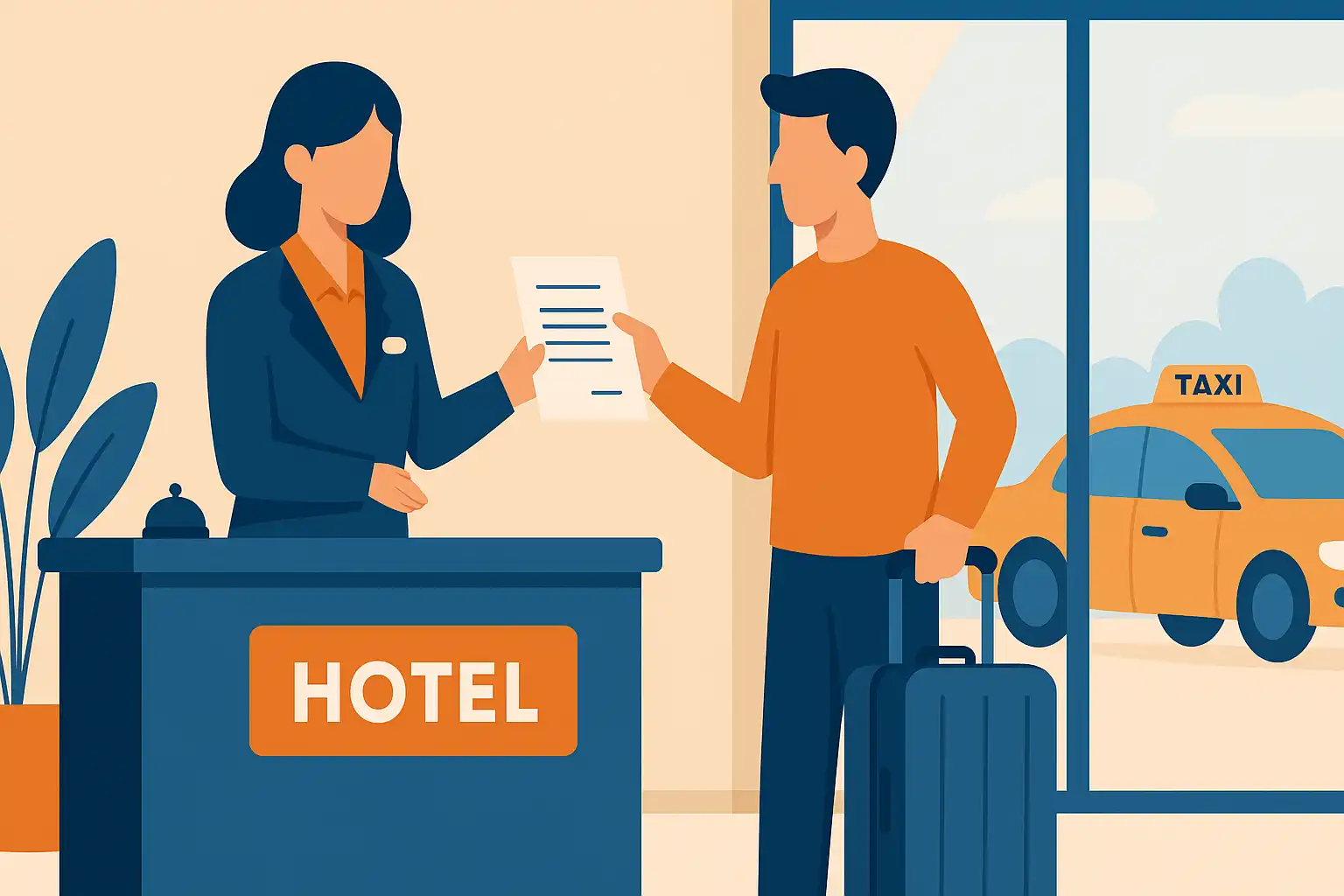
Hotel Walk Letter Template: Professional Guest Communication
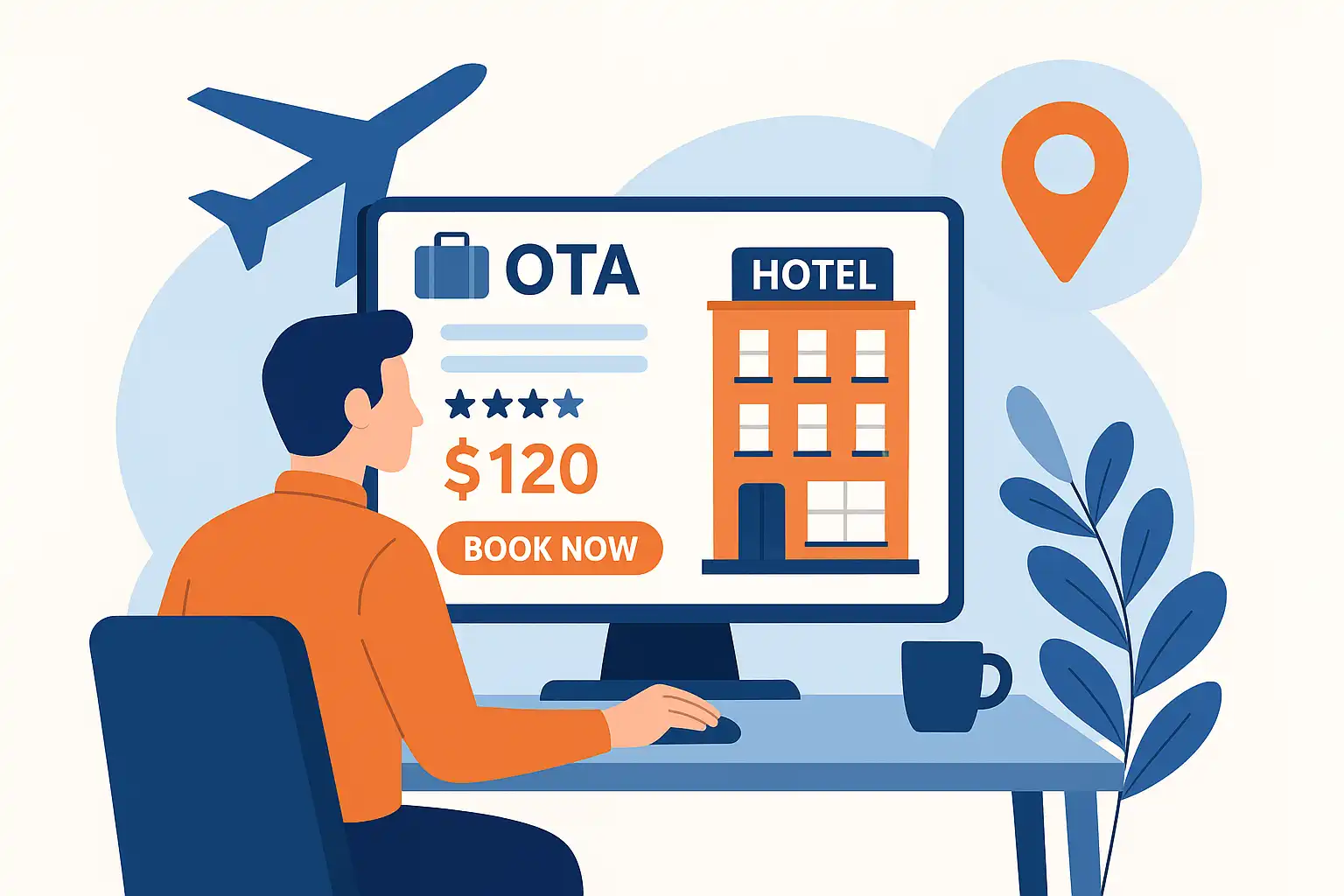
Online Travel Agents: What They Are and How They Work

Hotel Security Systems: Modern Protection Solutions

Hotel Advertising: Complete Guide to Boost Bookings and Revenue
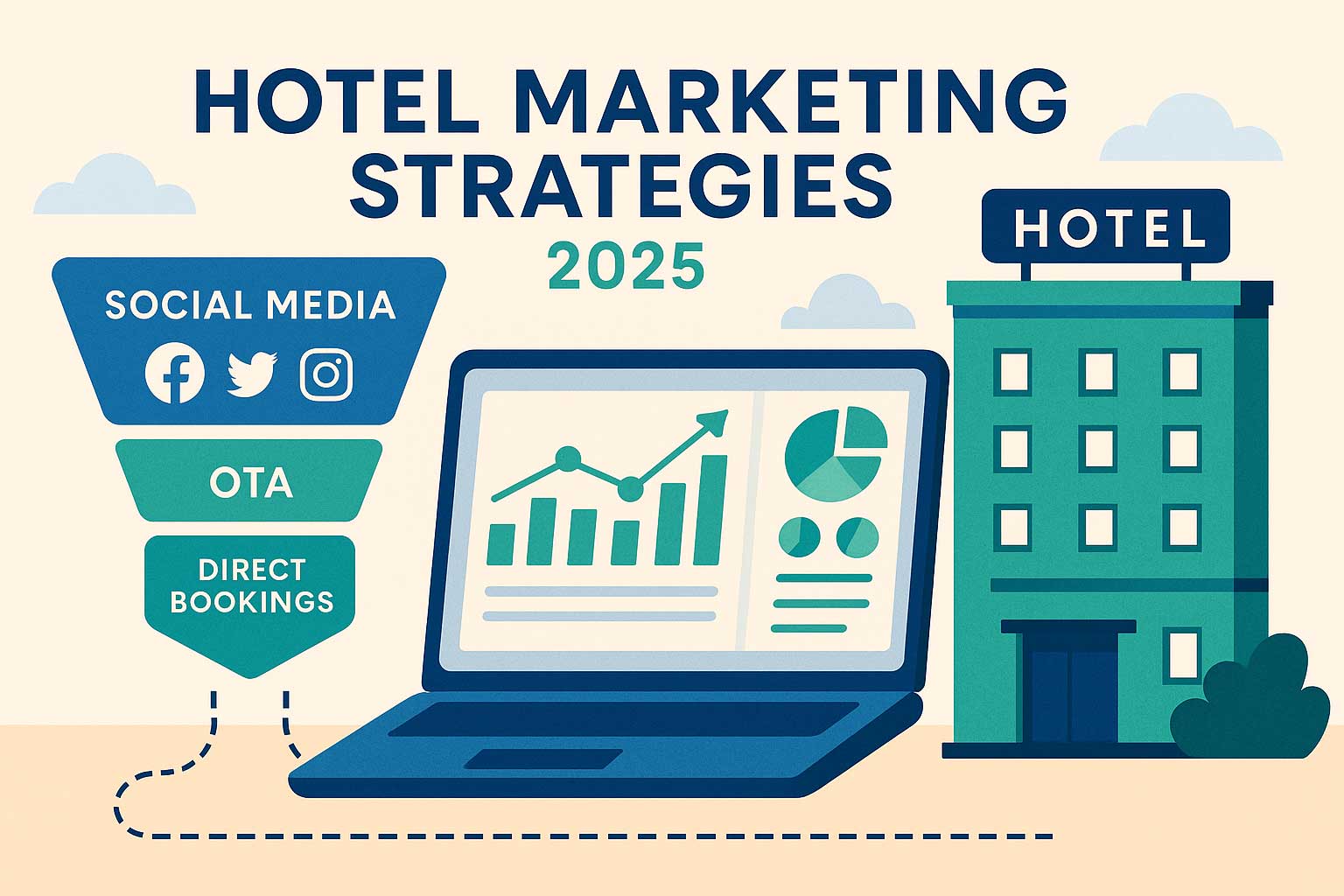
25 Hotel Marketing Strategy Ideas for 2025: Complete Guide

AI Reservation Agent: Revolutionizing Hotel Booking and Guest Experience

PMS Communication: Streamlining Property Management Through Effective Guest Messaging
Table of contents
The travel world has gone through a massive digital transformation. Today, online travel agents (OTAs) handle over half of all online hotel bookings and play a role in more than 80% of travelers' booking journeys. These platforms have completely changed the way we find, compare, and book places to stay. They bring huge opportunities and some challenges for hotels, while offering travelers unmatched convenience.
Whether you’re a hotel owner looking to boost your revenue through smart partnerships or a traveler curious about how these platforms operate, this guide will walk you through everything you need to know about online travel agents in 2024.
What are Online Travel Agents (OTAs)?
Online travel agents are websites and apps that connect travelers with hotels, flights, and other travel services. They gather listings from thousands of accommodation providers worldwide, letting guests search, compare, and book their travel plans instantly, with confirmation right away.
Big names like Booking.com, Expedia, Agoda, Hotels.com, and Airbnb serve millions every day. What started as simple booking engines have grown into full-fledged travel hubs offering vacation packages, last minute deals, and unique stays.
But OTAs are more than just booking sites. They’re powerful marketing tools for accommodation providers, giving hotels a global stage and sophisticated ways to reach travelers — something most independent hotels simply couldn’t manage alone. For travelers, OTAs make it easy to compare options, read reviews, and find competitive prices all in one place.
The scale is staggering: these platforms process billions in bookings every year and have reshaped the travel industry. They’re now essential allies for hotels and trusted resources for business travelers and vacationers alike.

How Online Travel Agents Work
Booking through an OTA is designed to be smooth and hassle-free. You start by entering your destination, travel dates, and number of guests. The OTA then pulls live availability from connected hotels using advanced technology.
Behind the scenes, channel managers and property management systems work together to keep availability and pricing accurate across all platforms. This real-time sync helps avoid double bookings and ensures you see the latest room rates and availability no matter where you look.
Hotels typically pay OTAs a commission ranging from 10% to 30% per booking. The exact percentage depends on the platform, hotel type, and agreements in place. This setup means OTAs earn only when they deliver bookings, making them performance-driven partners rather than upfront expenses.
OTA Business Models
Online travel agents operate under different business models, each with its own perks for hotels and travelers:
- The merchant model has OTAs collecting payment upfront from guests and paying hotels after checkout. This gives OTAs more control over pricing and packages. Expedia Group often uses this model, allowing them to bundle flights and hotels into attractive vacation deals.
- The commission model means guests pay hotels directly, and hotels pay OTAs a commission after the stay. Booking.com mainly uses this approach, reducing financial risk while keeping strong hotel partnerships.
- The advertising model is common on metasearch sites like Google Hotel Ads, where hotels pay per click for visibility instead of per booking. This gives hotels more control over their marketing spend.
Many OTAs use a hybrid model, mixing these approaches to balance traveler convenience and hotel revenue.
Major Online Travel Agent Platforms
The OTA world is diverse, with platforms focusing on different markets and commission rates. Knowing each one’s strengths helps hotels pick the best channels and travelers find the right booking sites.
| Platform | Daily Bookings | Global Reach | Average Commission | Primary Focus |
|---|---|---|---|---|
| Booking.com | 1.5 million | 200+ countries | 15% | Global accommodation |
| Expedia Group | 800,000+ | 70+ countries | 16% | Vacation packages |
| Agoda | 500,000+ | Asia-Pacific focus | 18% | Budget-friendly options |
| Airbnb | 300,000+ | 220+ countries | 14-20% | Unique stays & experiences |
Global OTA Leaders
Booking.com leads the pack with about 1.5 million daily bookings worldwide. They list over 2 million properties and charge an average commission of 15%. Their strength lies in a vast inventory and strong appeal to both business travelers and vacationers.
Expedia Group runs 200+ travel sites like Hotels.com and Orbitz, attracting over 600 million visits monthly. With a 16% average commission, they specialize in vacation packages that bundle flights, hotels, and more — perfect for travelers planning full trips.
Agoda shines in Asia-Pacific with over 2 million properties, focusing on affordable accommodations and unique local experiences. It’s a go-to for budget-conscious travelers and hotels targeting Asian markets.
Airbnb changed the game with 7 million listings worldwide and commissions between 14-20%. Originally for unique rentals, they now include traditional hotels, opening new doors for diverse property types.
Regional and Specialty OTAs
Some OTAs focus on specific regions or traveler types. Trip.com dominates China’s market, while MakeMyTrip leads in India, both offering localized services and payment options.
Specialty platforms cater to niches: Hostelworld targets budget travelers and backpackers, Mr & Mrs Smith focuses on luxury hotels, and HRS serves European business travelers with corporate tools and negotiated rates.
These niche OTAs often convert better for hotels that fit their audience, making them valuable complements to major global platforms.
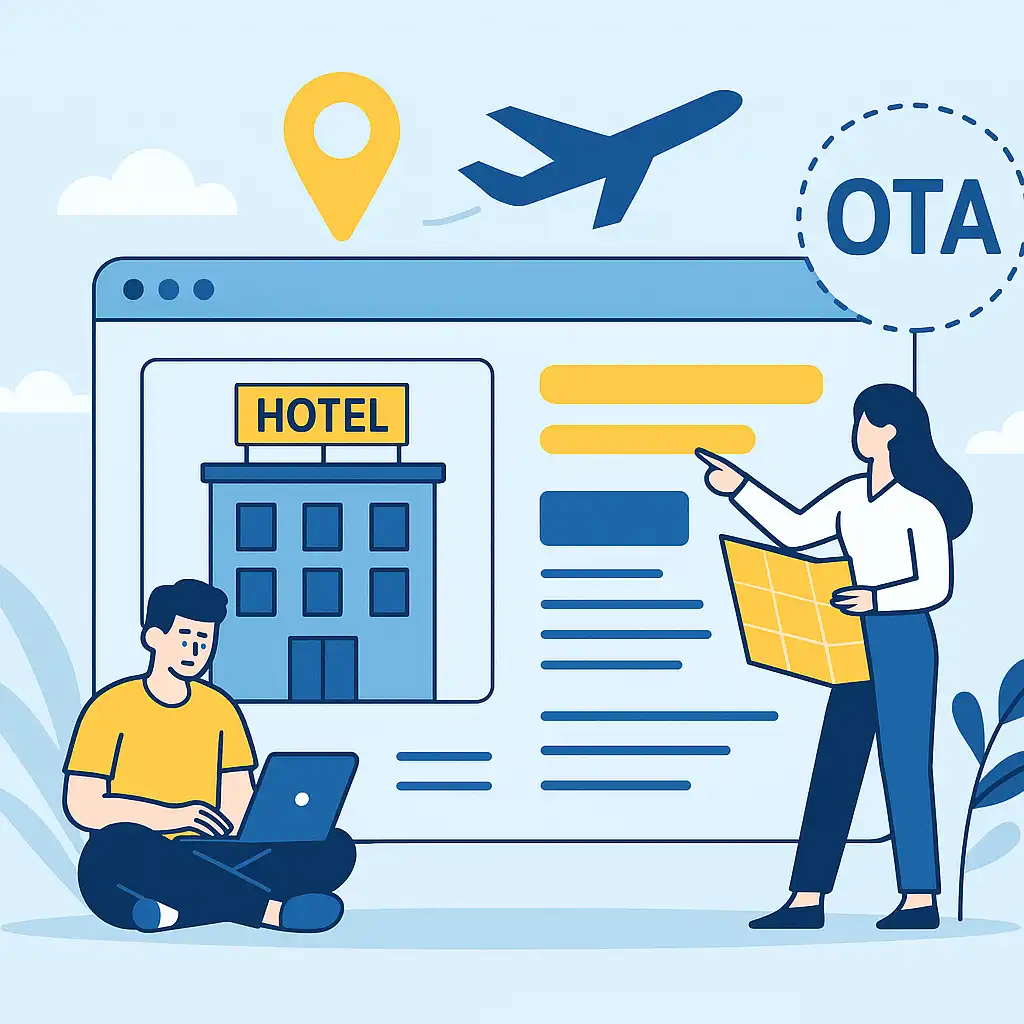
Benefits of OTAs for Hotels
For hotels, especially independent ones, OTAs open doors to global markets without huge marketing budgets. They level the playing field, letting smaller properties compete with big chains and reach guests worldwide.
OTAs don’t just list your property—they invest billions in SEO, advertising, and brand building. When your hotel shows up on these platforms, you benefit from their reputation and the trust travelers place in them.
One of the biggest perks is the “billboard effect.” Travelers might discover your hotel on an OTA but then book directly with you, boosting your direct bookings thanks to that initial exposure.
OTAs also bring in diverse guests — last minute bookers, international travelers, and specific customer segments — thanks to smart targeting algorithms and user data.
Pros and Cons of Booking Through OTAs (Traveler Perspective)
Knowing the upsides and downsides of using OTAs helps travelers choose what works best for their needs.
Advantages for Travelers
Price competitiveness is a big draw. OTAs often have exclusive deals and last minute offers that travelers won’t find elsewhere. Plus, comparing room rates across many hotels saves time and money.
Easy comparison shopping means no need to hop between dozens of hotel websites. Filters let travelers narrow down by price, amenities, reviews, and location, with professional photos and detailed info all in one spot.
Many credit cards and loyalty programs reward OTA bookings with extra points, sometimes more than booking directly with hotels.
Bundled packages for flights, hotels, and car rentals can offer great savings and convenience, especially for complex trips or first-time visitors.
Disadvantages for Travelers
Changing or canceling bookings can be trickier through OTAs, often with stricter policies and higher fees than direct hotel reservations.
Frequent travelers may miss out on elite status perks like upgrades or late checkouts, as hotels often reserve those for direct bookings.
Sometimes hidden fees or currency charges make OTAs more expensive than they seem at first glance.
Customer service can be complicated since travelers might need to go through the OTA instead of the hotel, which can slow problem resolution.
Best Practices for Hotels Working with OTAs
To get the most from OTAs, hotels need a smart, balanced approach that weighs commissions against booking potential. Treat OTAs as key partners, not just extra channels.
Optimizing OTA Listings
Great photos are essential. High-quality images of rooms and amenities can significantly boost bookings. Investing in professional photography pays off.
Complete and detailed profiles help travelers make confident choices and reduce negative reviews. Include info on Wi-Fi, parking, breakfast, and nearby attractions.
Keep listings updated, especially after renovations or new services launch. Outdated info hurts bookings and guest satisfaction.
Competitive pricing and dynamic strategies help maximize revenue while staying attractive compared to local competitors.
Revenue Management Strategies
Use channel managers to keep inventory accurate across all platforms, preventing overbookings and errors.
Adjust prices based on demand, local events, and seasons. Use promotions and last minute deals to fill slow periods.
Target specific traveler groups through the right OTAs — business travelers, vacationers, or budget seekers.
Keep an eye on competitors’ pricing and offerings to stay competitive.
Review Management
Reviews heavily influence bookings. Over 75% of consumers trust online reviews, and most read them before booking.
Respond promptly and professionally to all reviews, positive or negative. Show you value feedback and address concerns.
Collect guest feedback in real-time during stays to fix issues before they become negative reviews.
Higher review scores and active engagement can improve your OTA ranking and visibility.
Choosing the Right OTAs for Your Property
Pick OTAs that match your target audience, budget, and business goals. Smaller hotels usually work with 5-7 OTAs, larger ones with 10 or more.
Focus on geographic markets that matter to you. Asian-focused hotels might prioritize Agoda and Trip.com; European properties may lean on Booking.com and regional platforms.
Look for niche OTAs that fit your property style — luxury, eco-friendly, or boutique.
Negotiate commissions and terms to find the best deal for your hotel.
Maximizing Direct Bookings While Using OTAs
Leverage the billboard effect by using OTA exposure to drive direct bookings. Encourage guests to book on your own website with perks and incentives.
Make sure your website matches OTA listings in room types, policies, and prices to avoid confusion.
Offer best rate guarantees, loyalty perks, exclusive discounts, and upgrades to make direct bookings more attractive.
Build long-term relationships with guests to encourage repeat business.
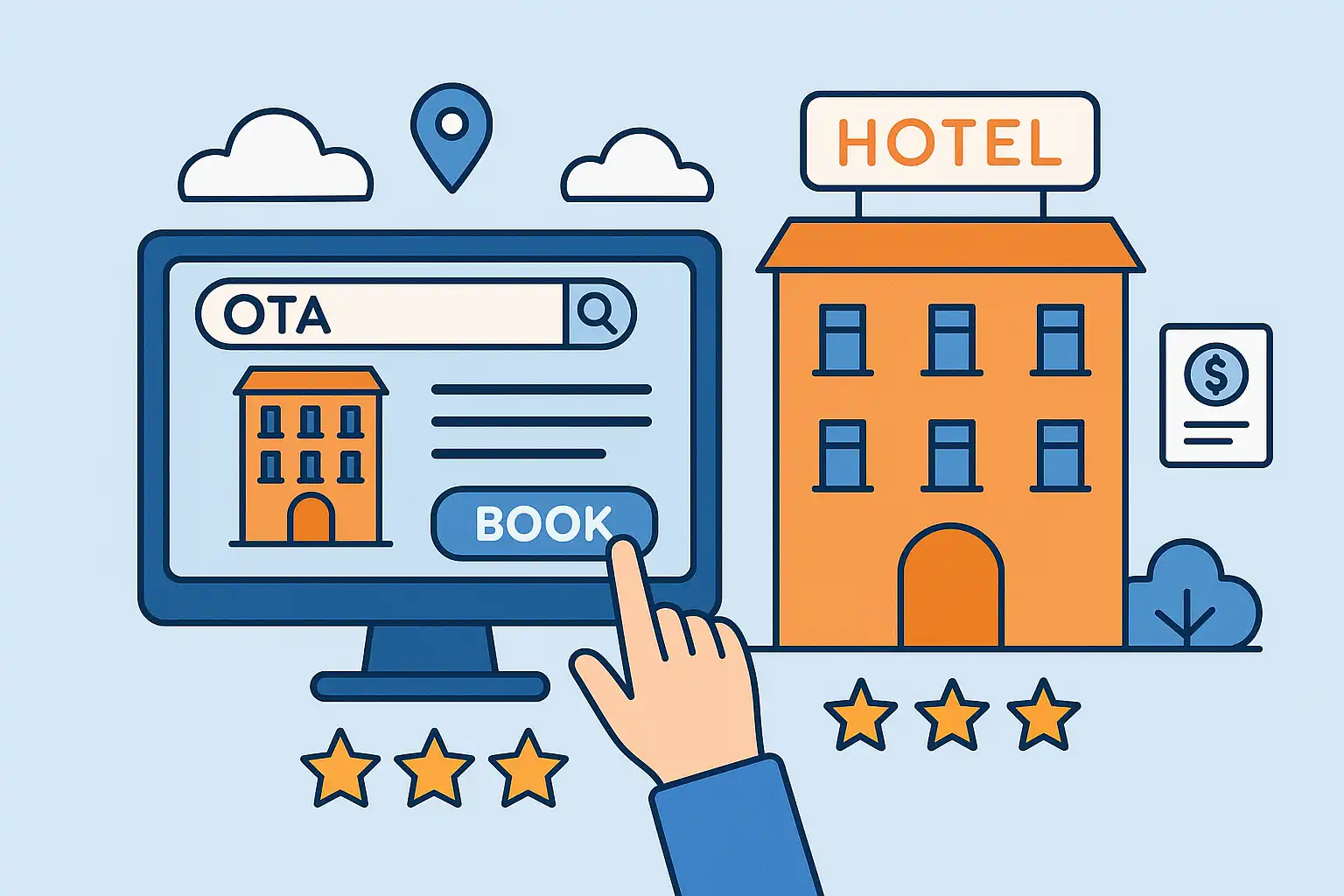
Technology Tools for OTA Management
OTA Channel managers automate inventory and pricing across OTAs, reducing manual work and errors.
Integrate property management systems for seamless data flow and automatic updates.
Use revenue management tools for pricing optimization and demand forecasting.
Optimize your booking engine for smooth direct reservations with mobile-friendly design and multiple payment options.
Analytics help track which OTAs bring the best guests and revenue, guiding marketing and commission decisions.
Future of Online Travel Agents
The OTA landscape keeps evolving fast. Mobile and voice search are changing how travelers find hotels, so OTAs must keep up with new tech.
AI and machine learning allow more personalized recommendations, improving user experience and conversion rates.
Sustainability is becoming a key factor, with OTAs highlighting eco-friendly hotels to meet traveler demand.
Regulations and direct booking pushes may reshape OTA commissions and business models.
OTAs are expanding into booking experiences and activities, offering more ways to engage travelers.
Virtual and augmented reality might soon let travelers tour hotels virtually before booking, giving early adopters an edge.
Conclusion
Online travel agents have reshaped travel, giving hotels access to global audiences and travelers convenient booking options with competitive prices. Success today means using OTAs strategically while nurturing direct customer relationships.
For hotels, OTAs are valuable marketing partners, not just booking channels. By optimizing listings, managing reviews, and leveraging technology, properties can maximize OTA benefits and grow direct bookings sustainably.
Travelers get the best of both worlds by using OTAs for discovery and comparison, then booking directly for flexibility and perks.
As travel continues to change, the most successful hotels will balance OTA partnerships with direct bookings to ensure lasting profitability and great guest experiences across all platforms.
